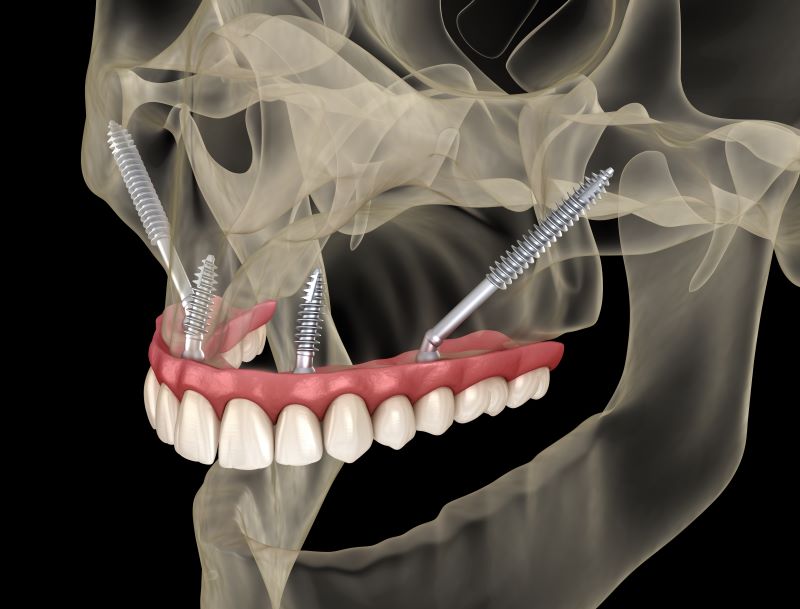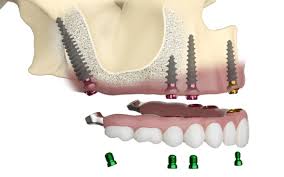Zygomatic & Pterygoid Implants
in Naranpura, Ahmedabad
The Final Solution for “No Bone” Cases – Fixed Teeth When Others Say No
Have you been told that you are not a candidate for dental implants due to severe bone loss in your upper jaw? Have you failed multiple bone grafts or sinus lifts? Zygomatic and Pterygoid Implants are advanced surgical solutions that bypass the need for jawbone entirely by anchoring into the stable, non-resorbing bones of the mid-face.
At Sanghvi Face & Dental Hospital, Dr. Darshan Sanghvi is one of the few Maxillofacial Surgeons in Ahmedabad specialized in these “rescue” implant techniques, providing fixed teeth to patients with extreme bone atrophy.

What are Zygomatic Implants?
Zygomatic implants are extra-long implants that are anchored in the Zygomatic bone (cheekbone) instead of the jawbone. The cheekbone is dense, stable, and never shrinks, making it the perfect foundation for permanent teeth.
Why Choose Zygomatic Implants?
- No Bone Grafting: Avoid the months of waiting and pain associated with hip or chin bone grafts.
- Immediate Function: In most cases, we can fix a permanent bridge within 72 hours of surgery.
- High Success Rate: Because the cheekbone is so dense, these implants have a success rate of over 98%, even in challenging cases.

What Are Pterygoid Implants?
Pterygoid implants are placed in the Pterygomaxillary region (at the very back of the upper jaw). This area provides incredibly strong anchorage in the dense bone where the jaw meets the skull.
The Benefits of Pterygoid Implants:
- Eliminate Sinus Lifts: These implants are placed behind the sinus cavity, meaning we don’t have to perform complex sinus surgeries.
- Full Arch Support: They provide the “pillars” needed at the back of the mouth for a stable, full-arch bridge.
- No Cantilevers: By placing implants at the very back, we ensure your back molars are fully supported for powerful chewing.
The Surgical Advantage: Why a Maxillofacial Surgeon?
Zygomatic and Pterygoid implants are complex surgical procedures that require an intimate knowledge of facial anatomy, including the nerves, sinuses, and blood vessels of the mid-face.
As an Oral and Maxillofacial Surgeon, Dr. Darshan Sanghvi has the hospital-grade training required to perform these procedures safely. We use:
- 3D CBCT Guided Surgery: To map the precise path of the implant through the facial bones.
- Conscious Sedation: Ensuring a completely stress-free and painless experience for the patient.
- Prosthetic Precision: Custom-designing the bridge to ensure your facial profile and lip support are restored to their youthful state.
When Are Zygomatic Implants Needed?
the upper jawbone is severely resorbed and cannot hold regular implants
bone grafting or sinus lift procedures are not feasible or have failed
For patients who want a faster and fixed solution without undergoing multiple surgeries
In full-mouth rehabilitation cases where upper teeth are missing or damaged
When Are Pterygoid Implants Needed?
there is severe bone loss in the upper back jaw due to aging, tooth loss, or disease
there is severe bone loss in the upper back jaw due to aging, tooth loss, or disease
When the patient wants to avoid sinus lift surgery
When stable support is needed for full-arch prosthesis in the upper jaw (often used with zygomatic or basal implants)
Benefits of Zygomatic Implants
No need for bone grafting or sinus lift
Immediate placement and early restoration possible
Strong anchorage in zygomatic (cheek) bone
Suitable even for patients with extreme bone loss
Minimizes the number of surgeries and overall treatment time
Restores facial support and chewing ability effectively
Benefits of Pterygoid Implants
Strong anchorage in dense bone — no grafting required
Ideal for full-mouth rehabilitation
Reduces treatment time and cost by avoiding sinus surgeries
Enables fixed teeth even in severely resorbed upper jaws
Immediate or early loading possible in many cases
High long-term success rates with experienced implantologists
Process
CBCT Scan and Digital Planning
Detailed scan to analyze facial structure and zygomatic bone positioning
Surgical Procedure
Under anesthesia, implants are placed through the upper jaw into the zygomatic bone
Immediate Loading (if suitable)
Temporary fixed bridge is placed within 48–72 hours
Healing and Final Prosthesis
After a few months of integration, the permanent prosthetic is placed for long-term use and aesthetics

Why choose us
- Personalized Treatment Plans: Tailored to your unique needs and goals.
- Advanced Technology: Utilizing the latest dental and facial aesthetic innovations.
- Experienced Professionals: Our team of skilled dentists and surgeons are dedicated to excellence.
FAQs
Yes. Many of our patients come to us after conventional implants have failed or bone grafts have been rejected. Zygomatic and Pterygoid implants are often the successful “Plan B.”
Yes—for the better! By providing internal support for your lips and cheeks, these implants can reverse the “sunken” look caused by long-term bone loss and denture wear.
Surprisingly, no. Because we anchor into dense bone and avoid grafting, the healing is often faster than traditional surgery. Most patients are eating soft foods with their new teeth within 3 to 4 days.
Reclaim Your Smile in Ahmedabad
- Specialist: Dr. Darshan Sanghvi (Con. Oral and Maxillofacial Surgeon & Implantologist)
- Location: Sanghvi Face and Dental Hospital, Opp Ankur Bus Stop, Naranpura, Ahmedabad , Gujarat – 13
- Contact: 079 – 27439850, 07990550920, 9824099850
- Book Your Appointment : https://calendar.app.google/ibP7s8QtjL6toUSRA
- Expertise: Zygomatic Implants | Pterygoid Implants | Failed Implant Rescue

